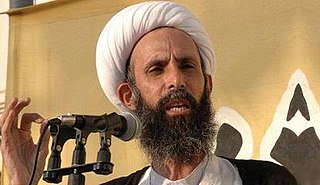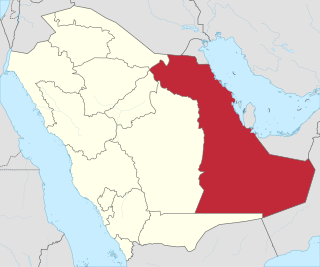
Human rights in Saudi Arabia are a topic of concern and controversy. Known for its executions of political protesters and opponents, the government of the Kingdom of Saudi Arabia has been accused of and denounced by various international organizations and governments for violating human rights within the country. An absolute monarchy under the House of Saud, the government is consistently ranked among the "worst of the worst" in Freedom House's annual survey of political and civil rights and was in 2023 ranked as the world's most authoritarian regime.
Capital punishment in Saudi Arabia is a legal punishment, with most executions in the country being carried out by decapitation (beheading) – Saudi Arabia being the only country in the world to still use the method. In 2022, recorded executions in Saudi Arabia reached 196, the highest number recorded in the country for any year over the last three decades.

Saudi Arabia's laws are an amalgam of rules from Sharia, royal decrees, royal ordinances, other royal codes and bylaws, fatwas from the Council of Senior Scholars and custom and practice.
Ali Hussain Sibat is a Lebanese national and former host of the popular call-in show that aired on satellite TV across the Middle East. On the show - described as "a Middle Eastern psychic hot line" by one source - he made predictions and gave advice to the audience.

The 2011Bahraini uprising was a series of anti-government protests in Bahrain led by the Shia-dominant and some Sunni minority Bahraini opposition from 2011 until 2014. The protests were inspired by the unrest of the 2011 Arab Spring and protests in Tunisia and Egypt and escalated to daily clashes after the Bahraini government repressed the revolt with the support of the Gulf Cooperation Council and Peninsula Shield Force. The Bahraini protests were a series of demonstrations, amounting to a sustained campaign of non-violent civil disobedience and some violent resistance in the Persian Gulf country of Bahrain. As part of the revolutionary wave of protests in the Middle East and North Africa following the self-immolation of Mohamed Bouazizi in Tunisia, the Bahraini protests were initially aimed at achieving greater political freedom and equality for the 70% Shia population.

The protests in Saudi Arabia were part of the Arab Spring that started with the 2011 Tunisian revolution. Protests started with a self-immolation in Samtah and Jeddah street protests in late January 2011. Protests against anti-Shia discrimination followed in February and early March in Qatif, Hofuf, al-Awamiyah, and Riyadh. A Facebook organiser of a planned 11 March "Day of Rage", Faisal Ahmed Abdul-Ahad, was allegedly killed by Saudi security forces on 2 March, with several hundred people protesting in Qatif, Hofuf and al-Amawiyah on the day itself. Khaled al-Johani demonstrated alone in Riyadh, was interviewed by BBC Arabic Television, was detained in ʽUlaysha Prison, and became known online as "the only brave man in Saudi Arabia". Many protests over human rights took place in April 2011 in front of government ministry buildings in Riyadh, Ta'if and Tabuk and in January 2012 in Riyadh. In 2011, Nimr al-Nimr encouraged his supporters in nonviolent resistance.

The following is a timeline of the 2011–2012 Saudi Arabian protests from January to June 2012. The 2011–2012 Saudi Arabian protests are a series of ongoing protests taking place in Saudi Arabia, which began in January 2011, influenced by concurrent protests in the region.

Ayatollah Sheikh Nimr Baqir al-Nimr, commonly referred to as Sheikh Nimr, was a Shia sheikh from Al-Awamiyah in Saudi Arabia's Eastern Province. His arrest and execution were widely condemned by various governments and human rights organizations.
The Specialized Criminal Court is a non-Sharia court created in Saudi Arabia in 2008 that tries suspected terrorists and human rights activists. On 26 June 2011, the court started trials of 85 people suspected of being involved in Al-Qaeda in the Arabian Peninsula and the 2003 Riyadh compound bombings and in September 2011 another 41 al-Qaeda suspects appeared in the court. In the same year, the court held trial sessions of human rights activists, including co-founder Mohammed Saleh al-Bejadi of the Saudi Civil and Political Rights Association (ACPRA) and Mubarak Zu'air, a lawyer for long-term prisoners, and Khaled al-Johani, who spoke to BBC Arabic Television at a protest in Riyadh, thus becoming known as "the bravest man in Saudi Arabia". The court convicted 16 of the human rights activists to sentences of 5–30 years' imprisonment on 22 November 2011.
Dissidents have been detained as political prisoners in Saudi Arabia during the 1990s, 2000s, 2010s, 2020s and earlier. Protests and sit-ins calling for political prisoners to be released took place during the 2011–2012 Saudi Arabian protests in many cities throughout Saudi Arabia, with security forces firing live bullets in the air on 19 August 2012 at a protest at al-Ha'ir Prison. As of 2012, recent estimates of the number of political prisoners in Mabahith prisons range from a denial of any political prisoners at all by the Ministry of Interior, to 30,000 by the UK-based Islamic Human Rights Commission and the BBC.

Abdullah Hamid Ali al-Hamid (1950-2020) or Abu Bilal was a Saudi poet, Arabic professor, human rights activist and a co-founder of the Saudi Civil and Political Rights Association (ACPRA). He was imprisoned several times for calling for the establishment of a constitutional monarchy in Saudi Arabia.
Ali Mohammed Baqir al-Nimr is a Saudi Arabian former political prisoner who participated in the 2011–12 Saudi Arabian protests during the Arab Spring as a teenager. He was arrested in February 2012 and sentenced to death in May 2014, having previously awaited ratification of his sentence by King Salman of Saudi Arabia, which was to be carried out by beheading and crucifixion. Ali's trial was considered unfair by Professor of Human Rights Law Christof Heyns, and Amnesty International, as well as French President François Hollande and Prime Minister Manuel Valls, who called for the execution to be stopped.
The 2017–2020 Qatif unrest was a phase of conflict in the Qatif region of Eastern Province, Saudi Arabia, between Saudi security forces and the local Shia community, that arose sporadically starting in 1979, including a series of protests and repression during the 2011–12 Saudi Arabian protests.

The Qatif conflict is a modern phase of sectarian tensions and violence in Eastern Arabia between Arab Shia Muslims and Arab Sunni majority, which has ruled Saudi Arabia since early 20th century. The conflict encompasses civil unrest which has been sporadically happened since the 1979 uprising, pro-democracy and pro-human rights protests and occasional armed incidents, which increased in 2017 as part of the 2017–20 Qatif unrest.

The 2017–19 Saudi Arabian purge was the mass arrest of a number of prominent Saudi Arabian princes, government ministers, and business people in Saudi Arabia on 4 November 2017. It took place weeks after the creation of an anti-corruption committee led by Crown Prince Mohammed bin Salman.

Tarek Hussein is an Egyptian lawyer. He was born in 1993. He worked as a lawyer and a founding member of the Constitution Party and one of the party's young leaders.
Israa al-Ghomgham is a Saudi Arabian human rights advocate. She is especially known for her documentation of the 2017–18 Qatif unrest.
On 23 April 2019, the Kingdom of Saudi Arabia carried out a mass execution of 37 imprisoned civilians who had been convicted, 21 on the basis of confessions allegedly obtained under coercion and torture, for terrorism-related allegations in six provinces in the country. Fourteen of the people executed had been convicted in relation to their participation in the 2011–12 Saudi Arabian protests in Qatif, mostly on the basis of torture-induced confessions. The executions were carried out by beheading, and two of the bodies were left on public display. According to Saudi Arabia's Interior Ministry the convicts were all Saudi nationals. Thirty-two of those executed belonged to the country's Shia minority.
Murtaja Qureiris is a Saudi Arabian activist and member of the minority Shia. Qureiris was accused by the Saudi Government of joining a "terror group" and "sowing sedition", and was arrested in September 2014, when he was 13. According to The Guardian, he has been periodically held in solitary confinement. The Saudi authorities have not publicly commented on any details about his case, although in 2018, Saudi prosecutors suggested that they would pursue the death penalty. In June 2019, Amnesty International asked Saudi Arabia to rule out the death penalty for Qureiris and other teenagers who were arrested in 2014.








